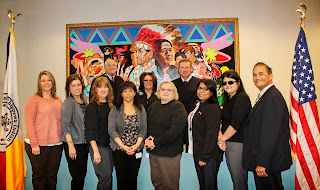As the issue of substance abuse—opioid, in
particular—has grown across the country and state to epidemic proportions, it
also has grown within sovereign nations, and Michigan’s Saginaw Chippewa Indian
Tribe is no exception.
During
the Michigan Association of Treatment Court Professionals annual
conference in March, for example, the Tribal Court delegation presented a
workshop entitled, “Tribal
Community Health and Opioid Abuse: An Integrative Approach.”
“It was the first opportunity for our Tribal
Court to speak about some of the collaborative efforts we have done within the tribal
community,” explained Tribal Court Chief Judge Patrick Shannon. “We
demonstrated the support we had from the tribal community to form the Healing
to Wellness program, to establish a Families Against Narcotics chapter, to broaden
alternatives to pain management, and to embrace cultural teachings.”
Tribal
Chief Frank Cloutier and Tribal Council asserted the issue of opioid addiction
and its effect on health care remain a priority for their administration.
“We
are willing to embrace opportunities like this in the spirit of collaboration,”
Chief Cloutier said. “Even at our Tribal Summit with Gov. Snyder last year, we
were planting the seeds of combining resources to bring in all our tribal departments.”
On a
national level, the Saginaw Chippewa Tribe embraced an opportunity earlier this
year to participate as one of six tribes across Indian Country to receive an
assessment of its Tribal Court by the U.S. Department of the Interior Bureau of
Indian Affairs. Chief Cloutier, Tribal Council, Judge Shannon, and the Tribal
Court staff met with Chief Judge Eric Mehnert, of the Penobscot Nation Tribal Court of Indian Island, Maine.
“Our Tribal Council was pleased to be one of
the few selected and invited to take an active role in the program,” Chief Cloutier
said.
Judge Mehnert, who also
sits on the bench as wellness judge for the Hopi Tribe of Arizona, was joined
by Chief Judge Mark Esqueda, of the Lac Vieux Desert Band of Lake Superior
Chippewa Indians, and the Supreme Court Judge Shannon Edwards, of the Oklahoma
Osage Nation.
The
judges conducted individual interviews with Tribal Court personnel, the Healing
to Wellness Court Committee members, and several departments – Nimkee Memorial
Wellness Center, Behavioral Health, and Tribal Police – that interact with
Tribal Court on a regular basis.
“The
assessment is really a chance for Tribal Members and stakeholders of the system
to offer their thoughts on what the court does well, where it has some
challenges, and where it can make some improvements so it can better serve the
community,” Chief Judge Shannon said. “When the information all comes together
and is shared, we can see a lot of growth toward what is being done within the Tribal
Court.”
He
added, “It is truly an innovative process and, according to what we have heard
from the assessment team, we are on the cutting edge of what is being done with
Tribal Healing to Wellness courts across the country.”
This
summer, Tribal Court Magistrate Carol Jackson, Prosecutor Graham Leach, Healing
to Wellness Case Manager Aubree Gross, and other team members attended the
National Association of Drug Court Professionals annual conference in
Washington, D.C. This year’s conference marked the first year when NADCP
offered a special track of curriculum for tribal court professionals.
“The
conference highlighted important and relevant factors pertaining to treatment
courts across the nation,” Gross said. “Attending conferences such as the NADCP
is important in ensuring Healing to Wellness team members are up-to-date on the
latest information.”
Healing
to Wellness Court is completing many of the key components highlighted in
successful treatment courts, Gross added.
According
to NADCP, Saginaw Chippewa Tribal Court’s program is one of 82 Tribal Healing
to Wellness courts across the country.
Chief
Judge Shannon is proud the Tribe is making its voice heard on so many levels.
“This
conference provided our Healing to Wellness court personnel to interact with
other tribal and state court professionals who are facing the opioid crisis in
their judicial systems. Invariably, the participants each obtained ideas for
solutions to work with our clients,” he said.
“Whether the meeting is tribal, local, state, regional or national in
context, such meetings benefit what we do here to save lives and promote a
healthy lifestyle.”

